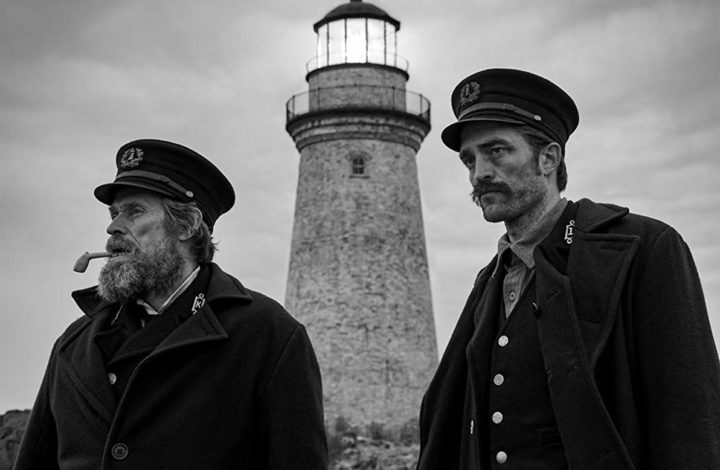
MPAA Rating: R | Rating: ★★★★½
Release year: 2019
Genre: Fantasy, Horror, Thriller Director: Robert Eggers
I woke up before the sun had risen and stood outside in the drizzling rain, waiting in an ever-growing queue to see the Cannes premiere of Robert Eggers’ The Lighthouse, his second feature film after his masterful and disturbing, The Witch. The bleary grey day felt appropriate to the occasion, as Eggers’ black-and-white film–in nearly-square 1.19:1 ratio and shot on 35mm with a special lens to add a vintage effect–is as doggedly grey as can be. Nightmarish yet poetic, there are quite few scenes in The Lighthouse which will make you laugh, and quite a few more which will disturb your countenance for the remainder of the day. This is not to say that it’s typical horror fare or even that it’s necessarily scary. Eggers’ vision here transcends conventional categorization–it is a historico-psychological-existential thriller; a bewildering, boozy bloody bromance; a sea-soaked single-location supernatural suspense story. It is, in short, A Lot To Take In.
The Lighthouse centers on two men, the grizzled and gruff lightkeeper Thomas Wake (Willem Dafoe) and his new second-in-command Ephraim Winslow (Robert Pattinson). They are charged with a four-week stint tending an isolated beacon in the northern Atlantic. Ephraim is charged to the daily thankless grunt work, while Wake is possessive with caring for the lighthouse itself. Wake’s former helper went mad, believing there was “salvation in the light” which contained “Saint Elmo’s flame.” By The Lighthouse‘s conclusion, we’ll know exactly what he means–both characters (and possibly certain audiences) will tip over the brink from sanity to madness.
The attention to detail is frighteningly rigorous. Every shot is perfectly framed and composed, the images paradoxically ancient and fresh. The images are still very visible despite their blackened hue, the mise-en-scène fascinating and complex. In a post-screening Q&A, Eggers described how the production built the entire lighthouse from the ground up, that everything we see was made for the film, including the 70-foot lighthouse which could been seen from sixteen miles away. Akin to The Witch’s script, the dialogue is of the late-19th century era, with Eggers and his co-writer brother Max turning to New England writer Sarah Orne Jewett’s knowledge for help, as well as borrowing heavily from the likes of Herman Melville. Pattinson’s character’s lines are based off Maine farming dialect, while Dafoe’s is the jargon of Atlantic fisherman of the time. While the period-authentic dialogue in The Witch was notable, the writing in The Lighthouse is poetically brilliant. Wake’s first (and oft-repeated words) are a toast containing lines like “God who hear’st the surges roll, deign to save a suppliant soul.” Both scurvy scalliwags have a few lengthy monologues which build to a fever pitch, full of grit and verve in their utterance. Pattinson and Dafore spew forth these lines with sincerity and ease, digging into their own bodies and souls and drawing out mesmerizing haptic wonders. Indeed, both actors give some of the strongest performances of their already-laudable careers; Dafoe’s final monologue is the best performance I’ve seen here here yet in Cannes, and Pattinson gives an exemplary physical performance as he pushes wheelbarrows, shovels coal, and smokes incessantly on the wind- and rain-swept rock. The film often seems to take place within Ephraim’s broken and guilt-ridden psyche, and we’re often not sure if what we’re seeing is real or hallucinatory. By the end of the film, the entire concept of existence itself is unmoored.
The question of God (or gods), myths, and the spiritual realm is of importance here. There are sirens and ghosts, mermaids and manifestations. The lighthouse seems to call to Ephraim; the island’s foghorn blares with a liturgical rhythm. “I’m God fearin’, if that’s what yer askin'” quips Ephraim when questioned as to whether he prays. A lone seagull acts as a sort of demonic spirit–the Black Philip of The Lighthouse–in its incessant pestering of Ephraim. Gulls contain the souls of dead sailors, says Wake; it’s bad luck to kill a seabird. When the inevitable bloody confrontation between man and bird finally comes, it seems to lead to a changing of the winds and the coming of an unabating storm, one which forces the two men to isolate themselves and survive on mainly booze. Akin to the alluring conch-like staircase of the lighthouse, their minds and souls begin spiral until they’re sucked down by the whirlpool of mental anguish and existential dread.
Writing at Bright Wall/Dark Room, Lauren Wilford once described Eggers as our “next great filmmaker” and appropriately compares him to Kubrick. Kubrick’s mad precision certainly came to mind which watching The Lighthouse, but I also thought of Bergman, Tarkovsky, Hitchcock, and Lynch, as well as Andrzej Zulawski’s Possession and Victor Sjöström’s The Phantom Carriage. Indeed, nearly every detail of The Lighthouse appears to be perfect. It takes a sort of mad genius to craft such a work of cinematic art.
IMDB Listing: https://www.imdb.com/title/tt7984734/
Leave a Reply